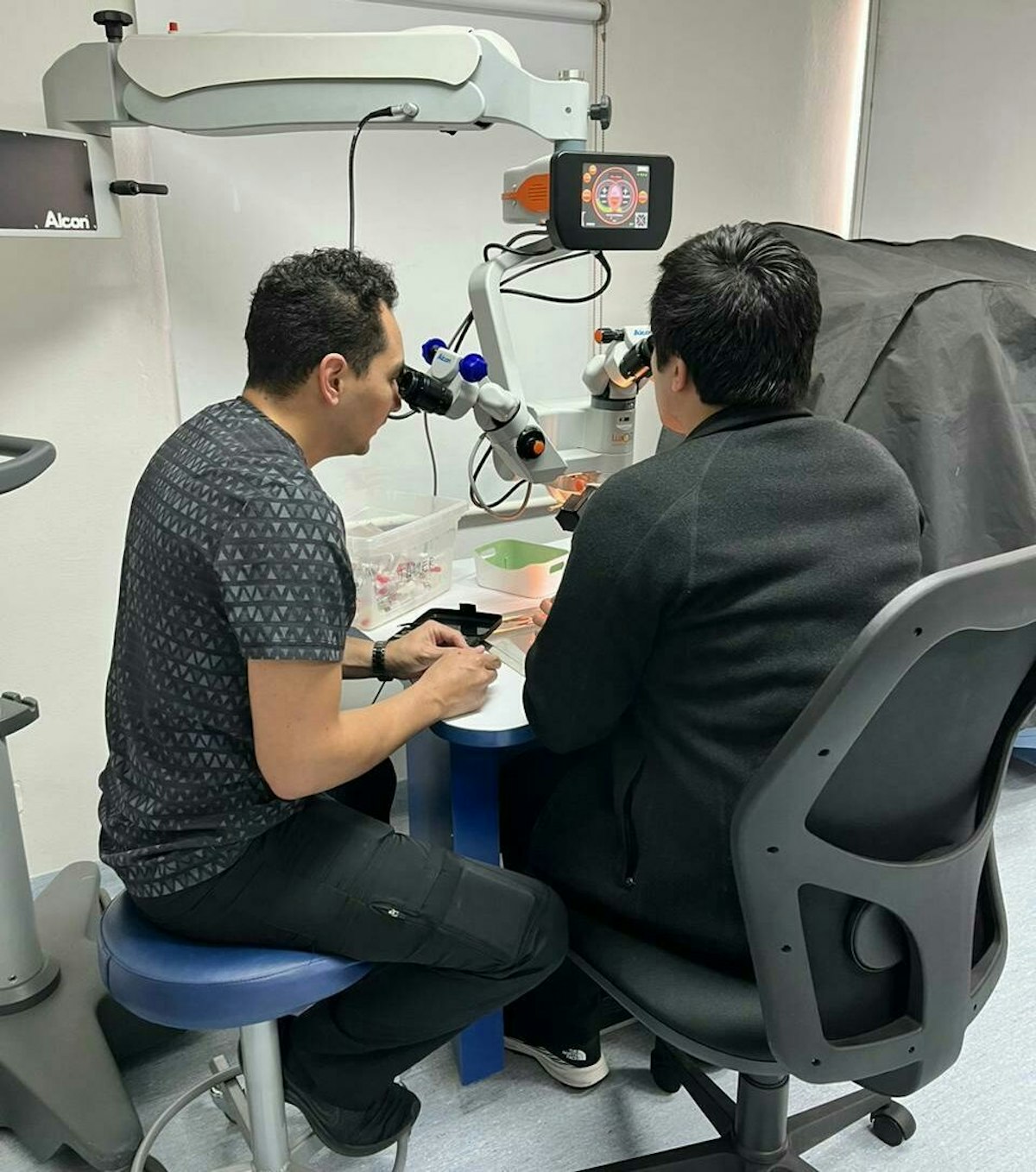Back in 2019, we teamed up with UC to create an ophthalmology simulation center in Chile. Since then, we held an in-person Flying Eye Hospital simulation project in 2019, and a Virtual project in 2021 during the height of the COVID-19 pandemic.

Virtual Flying Eye Hospital project in Chile a big success
The Orbis Flying Eye Hospital team successfully completed a month-long virtual training project in Chile with our partner Pontificia Universidad Católica de Chile (UC) and Title Sponsor and long-term partner the Alcon Foundation. Thanks to their hard work and support, seven Chilean ophthalmology residents were trained in complex surgical skills.

Eye care professionals use simulation equipment at the UC wet lab.
With the success of these projects, we returned virtually this year to continue our crucial eye care training. Delivered by Orbis Volunteer Faculty and staff via Cybersight and Zoom, this Virtual project provided surgical skills training to the Chilean residents with real-time feedback and demonstrations. UC faculty also provided additional hands-on training and support, both at the UC Simulation Center and Alcon Experience Academy in Santiago.
Flying Eye Hospital Lands in Chile For State-of-the-Art Simulation Training

Practice Makes Perfect
Simulation training Simulation training is one of the best ways for doctors to practice complex surgical techniques in a controlled setting. By using high-tech equipment that mimics real surgeries, doctors can break down a procedure into smaller parts, allowing teams to focus on specific skills individually—something you can’t do with a human eye.
During the project, our team of expert Volunteer Faculty and staff gave live feedback to residents so they could learn the best practices for their patients. It’s this teamwork and skill-sharing that gives residents the skills and confidence they need to save sight in their communities.
And this is especially important in Latin America where an estimated 2.3 million people are blind and 12.4 million are visually impaired. In a study published in the BMC Medical Education Journal researchers found virtual wet lab courses improved cataract surgical skills.

Eye care professionals train at the Alcon Experience Academy in Chile.
Meet Dr. Grau
Dr. Arturo Grau Diez is Assistant Professor of Ophthalmology at UC and specializes in laser and cornea eye surgery. He also serves as director of the simulation program at UC, the only one in the country.
During the latest Virtual Flying Eye Hospital program, he described how important simulation training is for teaching surgeons the proper techniques for successful treatments.

“We learned from Orbis you have to go step-by-step. Now simulation is part of the residency program and we are really proud of that. Residents know that many months before they touch a living patient in an operating room that they are going to simulate suture in the cornea. That’s amazing.”Dr. Arturo Grau Diez
As for UC's relationship with Alcon, he says, "Working with Alcon and working with Orbis, it's easy to create a strong program and to prove that residents learn specific competencies. They learn how to perform advanced techniques in Phaco surgery. And this is unique, not only Latin America, but the world over. We’re now seeing the residents improve faster in the way they perform live surgery on a real patient."
"I think that it's something special, really. Orbis changed the way we teach, and we proved that we can do it."
Expert in Training
Rodolfo Garretón is a third-year chief ophthalmology resident at UC who took part in the project. He found the training particularly helpful because he could finally put the theory he learned in class into practice.
Rodolfo says, “The main benefit of simulation is being able to practice specific techniques before being in surgery with a patient, so, even though the operations are supervised during residency, one feels more confident. It allows you to perform and practice as many times as you want.”
He also believes simulation training is useful for eye doctors of all levels of their career, even experts. "Since these are advanced cataract surgery techniques, I consider the sessions quite useful."
Equipped with the skills and knowledge to save sight, Rodolfo looks forward to making huge differences in patients' lives. "What I like most about ophthalmology is the resolution of the specialty. There are many people who we can help quickly and effectively solve their problems."
Rodolfo practices surgical eye care techniques using simulation technology.
Special Thank You
Thank you again to Title Sponsor the Alcon Foundation for sponsoring this project and to Alcon for generously donating space and resources to double the number of residents who could take part in this crucial training.
And an additional thank you to Sophia Labs who donated consumables for the course.
And of course, a huge thank you to our Volunteer Faculty for sharing their expertise with eye teams in Chile. Thanks to virtual projects like this one, we can improve the quality of ophthalmic training around the world at low cost, making donor’s dollars stretch even further.
Donate Today
Help support more virtual training projects like this!








